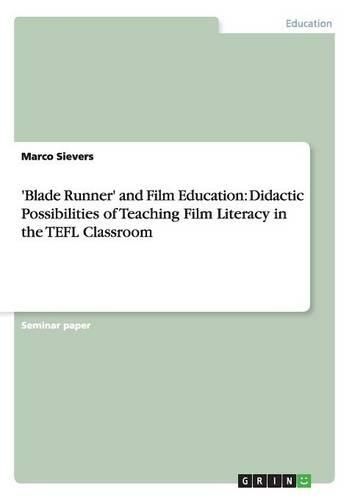Readings Newsletter
Become a Readings Member to make your shopping experience even easier.
Sign in or sign up for free!
You’re not far away from qualifying for FREE standard shipping within Australia
You’ve qualified for FREE standard shipping within Australia
The cart is loading…






Seminar paper from the year 2008 in the subject English - Pedagogy, Didactics, Literature Studies, grade: 1,0, University of Hannover (Englisches Seminar / Lehrgebiet Didaktik des Englischen), course: Hauptseminar Teaching Film (englische Fachdidaktik), 75 entries in the bibliography, language: English, comment: A very thoroughly researched paper that comes up with an experienced and creative argumentation. Scolary work on Blade Runner is excellently woven with teacherly ideas. , abstract: (…) Film education is already practiced in some European countries, for instance in Eng-land, France and in Scandinavia. (cf. Wharton & Grant 2005: 7; Kruger 2005: 7; Willig 2006: 132ff) German curricula also allow for films, but mostly as part of media education, which is embedded in several subjects and aims at providing students with media competence. This competence should enable them to orient themselves in a world dominated by audio-visual media. It wants to support a conscious and critical handling of media, as well as a creative and self-determined one. By understanding and questioning media contents and aesthetics stu-dents should be protected from being controlled by the media. (cf. Surkamp 2004: 2; Willig 2006: 131f, 137; Roller 2006: 73; Holighaus 2005a: 9) Film education in a narrower sense, aiming at film competence or film literacy, still has to be promoted in schools, though. (cf. Kruger 2005: 7) The intention of the paper at hand is to show possible applications of Ridley Scott’s science-fiction thriller Blade Runner, which foster film literacy within the context of teaching English as a foreign language (TEFL). First, it will explain the didactic value of films as TEFL devices, define film literacy as a learning target, and present an overview on ap-proaches and methods of teaching film. In doing so, a special focus will be set on film adapta-tions of literary texts. Then, the paper will turn to Scott’s science-fiction masterpiece and pro-vide a summary of
$9.00 standard shipping within Australia
FREE standard shipping within Australia for orders over $100.00
Express & International shipping calculated at checkout
Seminar paper from the year 2008 in the subject English - Pedagogy, Didactics, Literature Studies, grade: 1,0, University of Hannover (Englisches Seminar / Lehrgebiet Didaktik des Englischen), course: Hauptseminar Teaching Film (englische Fachdidaktik), 75 entries in the bibliography, language: English, comment: A very thoroughly researched paper that comes up with an experienced and creative argumentation. Scolary work on Blade Runner is excellently woven with teacherly ideas. , abstract: (…) Film education is already practiced in some European countries, for instance in Eng-land, France and in Scandinavia. (cf. Wharton & Grant 2005: 7; Kruger 2005: 7; Willig 2006: 132ff) German curricula also allow for films, but mostly as part of media education, which is embedded in several subjects and aims at providing students with media competence. This competence should enable them to orient themselves in a world dominated by audio-visual media. It wants to support a conscious and critical handling of media, as well as a creative and self-determined one. By understanding and questioning media contents and aesthetics stu-dents should be protected from being controlled by the media. (cf. Surkamp 2004: 2; Willig 2006: 131f, 137; Roller 2006: 73; Holighaus 2005a: 9) Film education in a narrower sense, aiming at film competence or film literacy, still has to be promoted in schools, though. (cf. Kruger 2005: 7) The intention of the paper at hand is to show possible applications of Ridley Scott’s science-fiction thriller Blade Runner, which foster film literacy within the context of teaching English as a foreign language (TEFL). First, it will explain the didactic value of films as TEFL devices, define film literacy as a learning target, and present an overview on ap-proaches and methods of teaching film. In doing so, a special focus will be set on film adapta-tions of literary texts. Then, the paper will turn to Scott’s science-fiction masterpiece and pro-vide a summary of